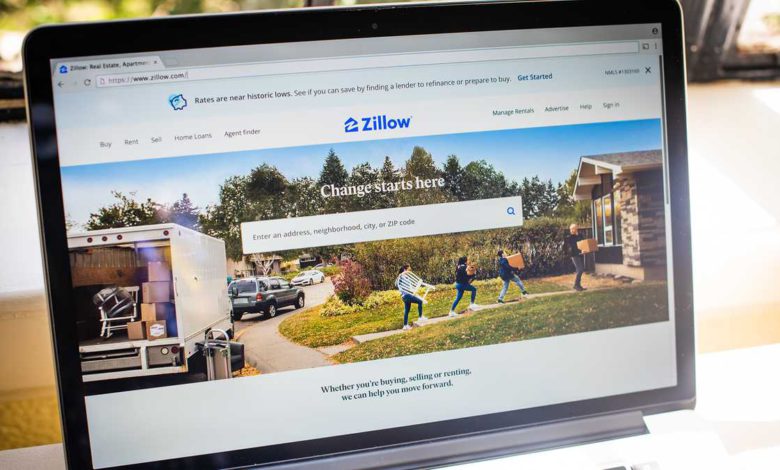

Zillow will stop buying homes through Zillow Offers for the rest of the year, as the company's iBuying program goes from full speed to full stop.The company announced on Monday it would not contract to buy any more homes in 2021 in order to work through the backlog of homes it has already bought.The "iBuyer" model used by Zillow and other real estate companies entails purchasing homes directly from sellers and then re-listing the properties after doing minor work. But thanks to the shortage of labor and materials, Zillow can't close, renovate and resell the homes fast enough."We're operating within a labor- and supply-constrained economy inside a competitive real estate market, especially in the construction, renovation and closing spaces," said Jeremy Wacksman, Zillow's chief operating officer, in a statement."Pausing new contracts will enable us to focus on sellers already under contract with us and our current home inventory," Wacksman said.Zillow will still market and sell the homes it has acquired through Zillow Offers, which has been on a purchasing tear this year. It bought 3,805 homes in the second quarter -- a record high for the company and more than double the number of homes bought in the first quarter, according to a note to company shareholders.Zillow, known for its online real estate listings, introduced an iBuyer program, Zillow Offers, in 2018 and now operates in 25 cities. Like other iBuyers -- such as Opendoor, RedfinNow and Offerpad -- Zillow Offers uses data and algorithms about the property and the market to make a cash offer on an off-market home and buys directly from the homeowner.IBuyers appeal to home sellers because closings can take place anywhere from seven to 90 days after the contract is signed and can provide some certainty and control over the sale of their home without the hassle of finding an agent and prepping the house for market. According to Zillow, the fee to the seller for Zillow Offers averages 5% but can vary based on market conditions.Home purchases by iBuyers now account for about 1% of the market, according to a report from Zillow. The share is still a tiny part of the whole market but shows tremendous growth over the past few years as the iBuyer share in some cities, like Phoenix, Atlanta or Charlotte, North Carolina, now tops 5%.Zillow wasn't alone among iBuyers in buying a lot of homes this year. IBuyers bought more houses, at higher prices, in the second quarter of this year than in any other quarter, according to research from Mike DelPrete, an independent real estate technology strategist and scholar in residence at the University of Colorado Boulder. That has surprised some skeptics who did not think the iBuyer model would be appealing to home sellers in a hot market.His research suggests that sellers are drawn to the certainty and ease of iBuying and the market conditions fueled its growth.Zillow's move to halt purchases is surprising, he said, particularly because it is so sudden."iBuyers have access to a tremendous amount of data, they can see months into the future and plan their inventory," said DelPrete. "So the fact that Zillow didn't see this coming and wasn't able to make adjustments before it had to resort to an iBuying lockdown is pretty surprising."This shift, he said, demonstrates how difficult this business model is to scale up. Large iBuyers need to be skilled at both managing billions of dollars in capital, but also the logistical specifics of prepping a home for sale, down to drywall and painting and closing deals."There is only so much that technology can do," said DelPrete. "At the end of the day, you need people to process a lot of transactions."However, the halt appears to be a Zillow-specific problem, not an iBuyer industry problem, DelPrete said."Zillow just kept barreling down and now they've hit this wall," he said.This is not the situation a growth-focused company wants to be in, he said."If you're trying to be number one in the market, slamming on the brakes is one of the worst things you can do," said DelPrete. "You want to make some adjustments before you get to that point -- slow down, switch gears. This is not the preferred outcome for Zillow."Open Door, the leading iBuyer ahead of Zillow at a distant second, said in a statement it is still open for business.
Zillow will stop buying homes through Zillow Offers for the rest of the year, as the company's iBuying program goes from full speed to full stop.
The company announced on Monday it would not contract to buy any more homes in 2021 in order to work through the backlog of homes it has already bought.
The "iBuyer" model used by Zillow and other real estate companies entails purchasing homes directly from sellers and then re-listing the properties after doing minor work. But thanks to the shortage of labor and materials, Zillow can't close, renovate and resell the homes fast enough.
"We're operating within a labor- and supply-constrained economy inside a competitive real estate market, especially in the construction, renovation and closing spaces," said Jeremy Wacksman, Zillow's chief operating officer, in a statement.
"Pausing new contracts will enable us to focus on sellers already under contract with us and our current home inventory," Wacksman said.
Zillow will still market and sell the homes it has acquired through Zillow Offers, which has been on a purchasing tear this year. It bought 3,805 homes in the second quarter -- a record high for the company and more than double the number of homes bought in the first quarter, according to a note to company shareholders.
Zillow, known for its online real estate listings, introduced an iBuyer program, Zillow Offers, in 2018 and now operates in 25 cities. Like other iBuyers -- such as Opendoor, RedfinNow and Offerpad -- Zillow Offers uses data and algorithms about the property and the market to make a cash offer on an off-market home and buys directly from the homeowner.
IBuyers appeal to home sellers because closings can take place anywhere from seven to 90 days after the contract is signed and can provide some certainty and control over the sale of their home without the hassle of finding an agent and prepping the house for market. According to Zillow, the fee to the seller for Zillow Offers averages 5% but can vary based on market conditions.
Home purchases by iBuyers now account for about 1% of the market, according to a report from Zillow. The share is still a tiny part of the whole market but shows tremendous growth over the past few years as the iBuyer share in some cities, like Phoenix, Atlanta or Charlotte, North Carolina, now tops 5%.
Zillow wasn't alone among iBuyers in buying a lot of homes this year. IBuyers bought more houses, at higher prices, in the second quarter of this year than in any other quarter, according to research from Mike DelPrete, an independent real estate technology strategist and scholar in residence at the University of Colorado Boulder. That has surprised some skeptics who did not think the iBuyer model would be appealing to home sellers in a hot market.
His research suggests that sellers are drawn to the certainty and ease of iBuying and the market conditions fueled its growth.
Zillow's move to halt purchases is surprising, he said, particularly because it is so sudden.
"iBuyers have access to a tremendous amount of data, they can see months into the future and plan their inventory," said DelPrete. "So the fact that Zillow didn't see this coming and wasn't able to make adjustments before it had to resort to an iBuying lockdown is pretty surprising."
This shift, he said, demonstrates how difficult this business model is to scale up. Large iBuyers need to be skilled at both managing billions of dollars in capital, but also the logistical specifics of prepping a home for sale, down to drywall and painting and closing deals.
"There is only so much that technology can do," said DelPrete. "At the end of the day, you need people to process a lot of transactions."
However, the halt appears to be a Zillow-specific problem, not an iBuyer industry problem, DelPrete said.
"Zillow just kept barreling down and now they've hit this wall," he said.
This is not the situation a growth-focused company wants to be in, he said.
"If you're trying to be number one in the market, slamming on the brakes is one of the worst things you can do," said DelPrete. "You want to make some adjustments before you get to that point -- slow down, switch gears. This is not the preferred outcome for Zillow."
Open Door, the leading iBuyer ahead of Zillow at a distant second, said in a statement it is still open for business.
Source link








